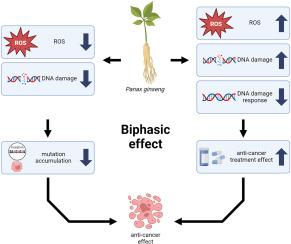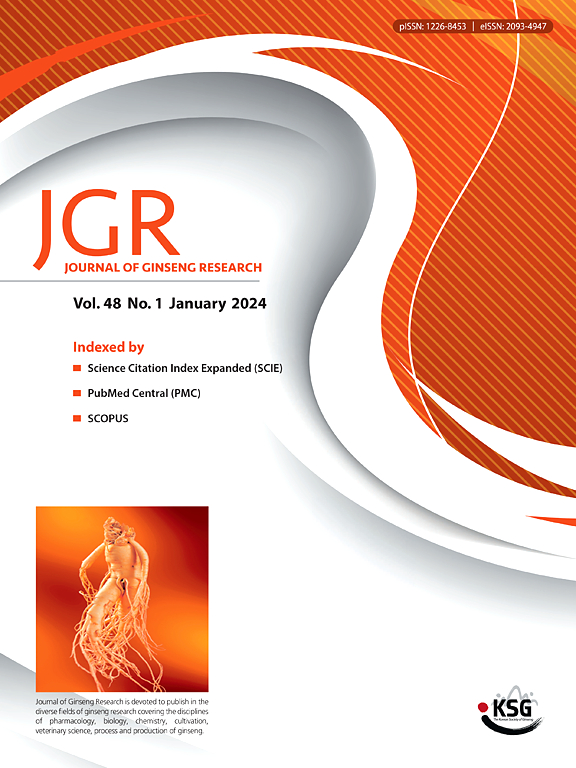Targeting the DNA damage response (DDR) of cancer cells with natural compounds derived from Panax ginseng and other plants
IF 6.8
2区 医学
Q1 CHEMISTRY, MEDICINAL
引用次数: 0
Abstract
DNA damage is a driver of cancer formation, leading to the impairment of repair mechanisms in cancer cells and rendering them susceptible to DNA-damaging therapeutic approaches. The concept of “synthetic lethality” in cancer clinics has emerged, particularly with the use of PARP inhibitors and the identification of DNA damage response (DDR) mutation biomarkers, emphasizing the significance of targeting DDR in cancer therapy. Novel approaches aimed at genome maintenance machinery are under development to further enhance the efficacy of cancer treatments. Natural compounds from traditional medicine, renowned for their anti-aging and anticarcinogenic properties, have garnered attention. Ginseng-derived compounds, in particular, exhibit anti-carcinogenic effects by suppressing reactive oxygen species (ROS) and protecting cells from DNA damage-induced carcinogenesis. However, the anticancer therapeutic effect of ginseng compounds has also been demonstrated by inducing DNA damage and blocking DDR. This review concentrates on the biphasic effects of ginseng compounds on DNA mutations—both inhibiting mutation accumulation and impairing DNA repair. Additionally, it explores other natural compounds targeting DDR directly, providing potential insights into enhancing cancer therapy efficacy.


利用从三七和其他植物中提取的天然化合物靶向癌细胞的 DNA 损伤反应(DDR)
DNA 损伤是癌症形成的驱动因素,它导致癌细胞修复机制受损,使癌细胞易受 DNA 损伤治疗方法的影响。癌症临床中出现了 "合成致死 "的概念,特别是随着 PARP 抑制剂的使用和 DNA 损伤反应(DDR)突变生物标志物的确定,强调了在癌症治疗中靶向 DDR 的重要性。目前正在开发针对基因组维护机制的新方法,以进一步提高癌症治疗的疗效。传统医药中的天然化合物以其抗衰老和抗癌特性而闻名,已引起人们的关注。特别是人参提取物,通过抑制活性氧(ROS)和保护细胞免受 DNA 损伤诱发的癌变,显示出抗癌作用。然而,人参化合物的抗癌治疗效果也通过诱导 DNA 损伤和阻断 DDR 得到了证实。本综述集中探讨了人参化合物对 DNA 变异的双相作用--既抑制突变积累,又损害 DNA 修复。此外,它还探讨了其他直接针对 DDR 的天然化合物,为提高癌症治疗效果提供了潜在的见解。
本文章由计算机程序翻译,如有差异,请以英文原文为准。
求助全文
约1分钟内获得全文
求助全文
来源期刊

Journal of Ginseng Research
CHEMISTRY, MEDICINAL-INTEGRATIVE & COMPLEMENTARY MEDICINE
CiteScore
11.40
自引率
9.50%
发文量
111
审稿时长
6-12 weeks
期刊介绍:
Journal of Ginseng Research (JGR) is an official, open access journal of the Korean Society of Ginseng and is the only international journal publishing scholarly reports on ginseng research in the world. The journal is a bimonthly peer-reviewed publication featuring high-quality studies related to basic, pre-clinical, and clinical researches on ginseng to reflect recent progresses in ginseng research.
JGR publishes papers, either experimental or theoretical, that advance our understanding of ginseng science, including plant sciences, biology, chemistry, pharmacology, toxicology, pharmacokinetics, veterinary medicine, biochemistry, manufacture, and clinical study of ginseng since 1976. It also includes the new paradigm of integrative research, covering alternative medicinal approaches. Article types considered for publication include review articles, original research articles, and brief reports.
JGR helps researchers to understand mechanisms for traditional efficacy of ginseng and to put their clinical evidence together. It provides balanced information on basic science and clinical applications to researchers, manufacturers, practitioners, teachers, scholars, and medical doctors.
 求助内容:
求助内容: 应助结果提醒方式:
应助结果提醒方式:


